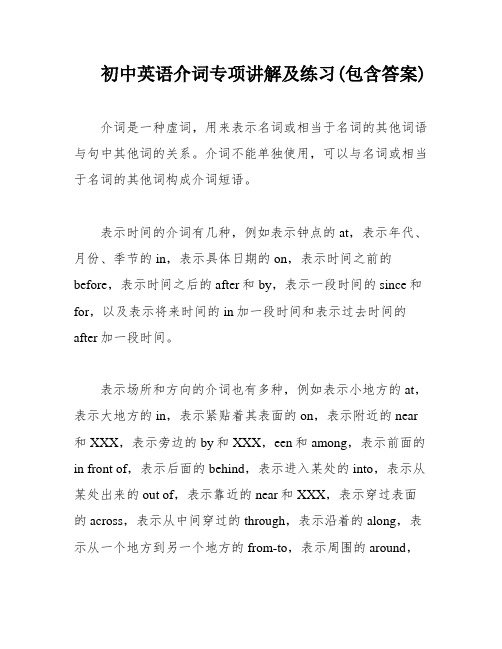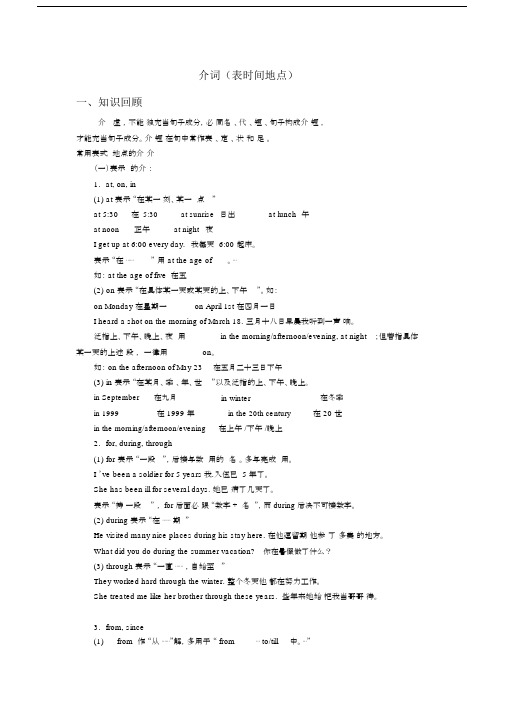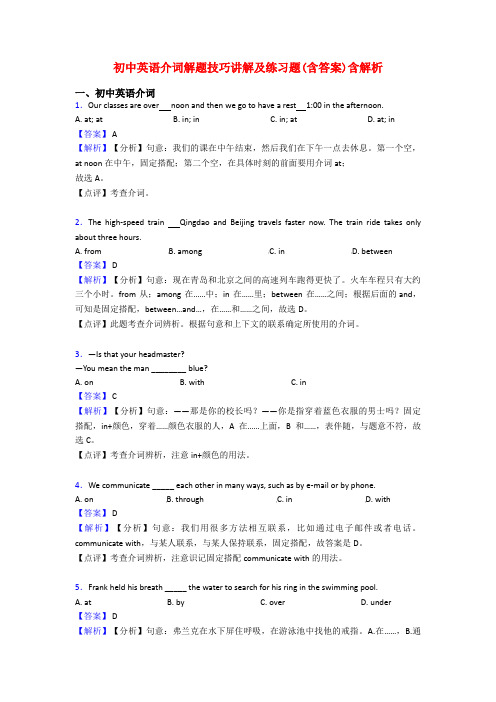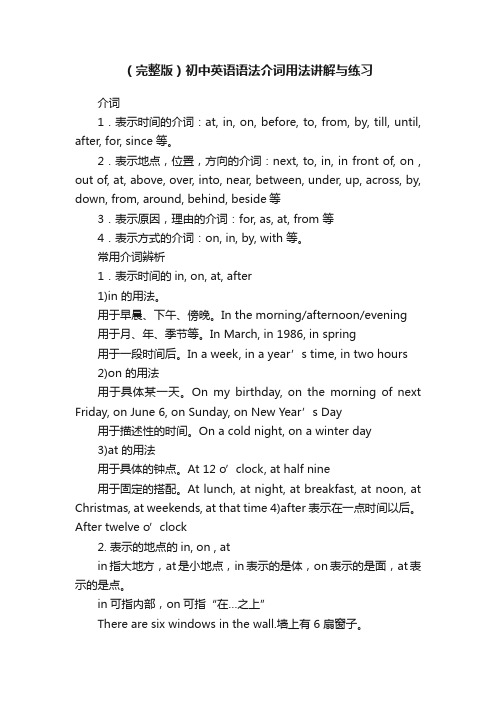初中介词和介词短语专题讲解(含练习)
初中英语介词专项讲解及练习(包含答案)

初中英语介词专项讲解及练习(包含答案)介词是一种虚词,用来表示名词或相当于名词的其他词语与句中其他词的关系。
介词不能单独使用,可以与名词或相当于名词的其他词构成介词短语。
表示时间的介词有几种,例如表示钟点的at,表示年代、月份、季节的in,表示具体日期的on,表示时间之前的before,表示时间之后的after和by,表示一段时间的since和for,以及表示将来时间的in加一段时间和表示过去时间的after加一段时间。
表示场所和方向的介词也有多种,例如表示小地方的at,表示大地方的in,表示紧贴着其表面的on,表示附近的near和XXX,表示旁边的by和XXX,een和among,表示前面的in front of,表示后面的behind,表示进入某处的into,表示从某处出来的out of,表示靠近的near和XXX,表示穿过表面的across,表示从中间穿过的through,表示沿着的along,表示从一个地方到另一个地方的from-to,表示周围的around,表示正上方的over,表示正下方的under,表示斜上方的above,表示斜下方的below。
介词的使用需要根据具体情况来判断,掌握介词的用法可以帮助我们更准确地表达自己的意思。
In using a language。
it'XXX to know about the culture and customs of the people you are XXX my experience。
as someone who has lived in different countries。
it's important to adapt and be respectful。
just like you would in your own country.With the right clothing and knowledge。
you can XXX。
(完整word版)初中介词(表时间地点介词)讲解练习及答案.doc

介词(表时间地点)一、知识回顾介虚,不能独充当句子成分,必同名、代、短、句子构成介短,才能充当句子成分。
介短在句中常作表、定、状和足。
常用表式地点的介介(一)表示的介:1. at, on, in(1)at 表示“在某一刻、某一点”at 5:30 在5:30 at sunrise 日出at lunch 午at noon 正午at night 夜I get up at 6:00 every day.我每天6:00起床。
表示“在⋯⋯” 用at the age of。
⋯如: at the age of five 在五(2)on 表示“在具体某一天或某天的上、下午”。
如:on Monday 在星期一on April 1st 在四月一日I heard a shot on the morning of March 18. 三月十八日早晨我听到一声响。
泛指上、下午、晚上、夜用in the morning/afternoon/evening, at night;但若指具体某一天的上述段,一律用on。
如: on the afternoon of May 23在五月二十三日下午(3)in 表示“在某月、季、年、世”以及泛指的上、下午、晚上。
in September 在九月in winter 在冬季in 1999 在 1999 年in the 20th century 在 20 世in the morning/afternoon/evening 在上午 /下午 /晚上2. for, during, through(1)for 表示“一段”,后接与数用的名。
多与完成用。
I ’ve been a soldier for 5 years我.入伍已 5 年了。
She has been ill for several days. 她已病了几天了。
表示“持一段” , for 后面必跟“数字 +名”,而 during 后决不可接数字。
介词及介词短语(单选题 30题 含解析)中考英语专题练习

介词及介词短语(单选题 30题含解析)中考英语专题练习一、单选题(共30题)1.— When will the graduation ceremony be held?—Oh, it will be held _________ 9 a.m. next Friday. Don’t be late.A. onB. atC. in2.—Can you come to my party this evening?—Sorry, I can’t. I have to prepare _______ my exams.A. ofB. forC. aboutD. with3.—What ________ do you like to do? —I like listening to music outdoors ______ sunny afternoons in winter.A.other; in B.else; on C.else; in D.other; on4.Because of the double reduction policy (双减政策), we have more time to relax ourselves________ Saturdays and Sundays.A.on B.at C.in D.for5.The large grassland,reaching out far away, looks extremely beautiful the blue and clean sky.A.againstB.aboveC.throughD.past6.I've ordered some flowers for Grandma and they will arrive two hours.A.inB.afterC.overD.for7.________ going back to school, we all stay at home to study online during the outbreak of the virus.A.Including B.Besides C.Along with D.Instead of8.We have history class ________ three o’clock every Friday afternoon.A.at B.on C.in D.to9.I can’t see Lucy because she is the tree.A. in front ofB. behindC. next to10.— ________May 6, Yi Yangqianxi won the Best New Actor Award at Hong Kong Film Awards. — What exciting news!A.In B.At C.On D.During11.We’ll have the school photo competition ________ the end of June.A.at B.in C.for D.during12.My sister said she wanted to find a partner________.A.practicing speaking with B.to practice speaking C.to practice speaking with 13.Amy wants to be a good learner ________ practicing more.A.by B.for C.on D.with14. The population of our city has increased _____40% compared with _____of 3 years ago.A. by; thatB. to; thoseC. with; onesD. of; it15.________ 2003, China sent its first astronaut, Yang Liwei, into space.A.In B.On C.At D.Of16.Our English teacher came into the classroom ________ a smile on her face.A.in B.over C.with D.against17.The moonlight goes ____ the window and makes the room bright.A.across B.through C.over D.in18.Mingming will have a class meeting _______ 3:30 this afternoon.A.on B.in C.at19.Kate felt excited to see a group of sheep walking ________ her into a village in Qinghai. A.over B.past C.across D.through20.The woman stood ________ the window, watching the girls dancing outside.A.with B.on C.by21.The young girl________a red dress is Millie.A.at B.in C.wears D.dresses22.Lao She is most famous ____his play ____a writer.A.for;as B.as;for C.for;is23.Don’t stay inside_______such a sunny morning. Let’s go out to enjoy the gentle wind and the sweet flowers.A.on B.in C.at24.The Hongkong Zhuhai— Macao Bridge(港珠澳大桥)is _________Hong Kong _____ Zhu Hai.A.from; from B.from; to C.to; to25.She looked sad,but said nothing. So we never understood what was ________ that day. A.on her mind B.in all C.in order D.of her age 26.—It’s impossible to learn physics well ________ knowledge o f maths.—I couldn’t agree more! So we should also learn maths well.A.against B.beyond C.without D.between27.The English passage is hard to understand because there are ________ twenty new words in it. A.at first B.at least C.at once D.at last28. Xinhua Zidian, or the New Chinese Dictionary, was first published ______1953.A.on B.in C.at D.for29. Ben was helping his mother when the rain began to beat heavily ________the windows.A. againstB. acrossC. aboveD. below30.— Many doctors and nurses went to Hubei in February.—Hubei is far from Heilongjiang. It’s ______ the south of China, ______ the south of Henan. A.in;to B.on;to C.in;on【参考答案】一、单选题(共30题)1.B【解析】句意:——什么时候举行毕业典礼什么?——哦,下星期五上午九点钟举行。
完整版初中介词和介词短语专题讲解含练习

介词及介词短语【考点直】1.常用介及其的主要用法及意2.介表示、方位、方式的基本用法3.—些易混介的辨析[法解】♦介词的功能介是一种虚,用来表示名或相当于名的其它句中其它的关系,不能独使用。
介可与名或相当于名的其它构成介短。
介短可在句中作定,状,表和足。
例如:The boy over there is John brother・(定 )The girl will be back in two hours.(状)♦介词和种类(1)介,常用的有at, in, on, about, across, before, beside, for , to, without 等。
(2)复合介,女D by means of, along with, because of, in front of, instead of 等。
♦不同介词的用法(1)表的介1)at, in on表示点用atp例女口:at six o' clock, at noon, at midnight o表示在某个世,某年,某月,某个季以及早晨,上午,下午,晚上,用in。
例如:in the nineteenth century, in 2002, in may, in winter, in the morning, in the afternoon 等。
表示具体的某一天和某一天的上午,下午,晚上,用0%例如I: on Monday, on July 1st, on Sunday morning 等。
2)since, after由since和after引的都可表示从去某一点开始的段,但since表示的段一直延到的刻,因而往往要与在完成用。
而alter所表示的段系去,因而要与一般去用。
例如:I haven 9 the a rd from him since last summer ・After five days the boy came back.3)in, afterin与将来用,表示“多以后”的意思,后面跟表示一段的。
初中英语介词解题技巧讲解及练习题(含答案)含解析

初中英语介词解题技巧讲解及练习题(含答案)含解析一、初中英语介词1.Our classes are over noon and then we go to have a rest 1:00 in the afternoon. A. at; at B. in; in C. in; at D. at; in【答案】 A【解析】【分析】句意:我们的课在中午结束,然后我们在下午一点去休息。
第一个空,at noon在中午,固定搭配;第二个空,在具体时刻的前面要用介词at;故选A。
【点评】考查介词。
2.The high-speed train Qingdao and Beijing travels faster now. The train ride takes only about three hours.A. fromB. amongC. inD. between【答案】 D【解析】【分析】句意:现在青岛和北京之间的高速列车跑得更快了。
火车车程只有大约三个小时。
from 从;among 在……中;in 在……里;between 在……之间;根据后面的and,可知是固定搭配,between…and…,在……和……之间,故选D。
【点评】此题考查介词辨析。
根据句意和上下文的联系确定所使用的介词。
3.—Is that your headmaster?—You mean the man ________ blue?A. onB. withC. in【答案】 C【解析】【分析】句意:——那是你的校长吗?——你是指穿着蓝色衣服的男士吗?固定搭配,in+颜色,穿着……颜色衣服的人,A 在……上面,B 和……,表伴随,与题意不符,故选C。
【点评】考查介词辨析,注意in+颜色的用法。
4.We communicate _____ each other in many ways, such as by e-mail or by phone.A. onB. throughC. inD. with【答案】 D【解析】【分析】句意:我们用很多方法相互联系,比如通过电子邮件或者电话。
介词及介词短语(根据句意填空 15题 含解析)中考英语专题练习

介词及介词短语(根据句意填空 15题含解析)中考英语专题练习一、根据句意填空(共15题)1.Mao Zedong was born ________ Shaoshan in 1893 and he returned to live here for a short time in 1927.2.They love simple activities the busy, stressful world.3.In his speech, he talked the importance of kindness.4.A the four great classical Chinese novels, my favourite is Journey to the West. 5.There is a low brick wall (在……之间) the garden and the field beyond.6.When I walked the room we shared, I found Claudio sitting at my bedside.7.Giving concerts wasn't easy for Beth in the beginning because usually she only played drums alone in her bedroom when she came home school.8.Singapore is also an interesting city. Large numbers of people, ideas, etc. are mixed together (在……下面)the same sky.9.“Grandpa, someone is waiting you to play chess,” I went to him and said.10.The weather here is wonderful. It's warm and sunny, clear blue skies every day.11.In Chinese culture, bamboo is well-known one of the “four gentlemen” in plants.12.Do you see? This is how plants talk. So don't touch plants fun. It may blame its neighbor.13.“There wasn't any treasure in the very first place, my son,”the father answered a smile. “But I think you have found your life's true purpose.”14.Pupils were able to see a new movie on TV called Monkey King________ November, 1979. 15.The whole class went camping e________ Tom, because he was seriously ill.【参考答案】一、根据句意填空(共15题)1.in【解析】句意:毛泽东1893年出生于韶山,1927年短暂返回韶山居住。
上海中考英语介词专项讲解及练习(包含答案)

一.介词的含义介词是一种虚词,用来表示名词或相当于名词的其它词语与句中其它词的关系,不能单独使用。
介词可以与名词或相当于名词的其它词构成介词短语。
二.表示时间的介词at (表示钟点): at 6:30 固定搭配 : at noon ; at night ; at present / at the momentin (表示年代/月份/季节): in July; in 2006; in September,1998 ;in spring固定搭配: in the morning / in the afternoon / in the evening on (表示具体日期: 某月某日/星期几): on Monday ; on Sunday morning ; on December 17before在--- 之前after 在--之后by在--之前(时间);到--为止until / till : 直到--(时间)since自从-- 以来for(接一段时间)during 在-- 期间from 从--时起in + 一段时间:--以后(用于将来时)within--之内after+ 一段时间:--以后(用于过去时)beyond --之外三.表示场所,方向的介词at 在某处(小地方)(at the cinema;at school;at home;at the railway station)in 在某处(大地方)(in China;in Beijing);在--里面(in the classroom;in the water)on 在--上面(紧贴着其表面): (on the table; on one’s face)near 在---附近beside:在--旁边by 在--旁边between在--和--之间among在--(3者或更多的人或物)当中in front of 在--的前面behind 在--的后面beside: 在—旁边into 进入--里out of 从--中出来near / nest to 靠近across穿过(沿着表面)through穿过(从中间)along 沿着from -- to -- 从--到-- around 在--周围over 在--的正上方under在--的正下面/ above 在--斜上方below 在--斜下方四.其他介词in 用(某种语言),穿着(某种颜色的衣服)about大约;关于from 来自---as像--(接句子);正如--; like 像--(接单词)with和--起;用-- without 没有--by通过(某种方式或手段);乘坐by bus(train /plane /ship /bike)on foot五.重要介词辨析(1)on, over与aboveOn 在……上面与物体表面有接触面Over 在……上方垂直正上方,表示“跨越,覆盖”Above在……上方“在……(偏)上方”,表示两者不接触例如:There is a bag on the desk.The lamp is over the table.The heaven is above us.(苍天在上。
(完整版)初中英语语法介词用法讲解与练习

(完整版)初中英语语法介词用法讲解与练习介词1.表示时间的介词:at, in, on, before, to, from, by, till, until, after, for, since 等。
2.表示地点,位置,方向的介词:next, to, in, in front of, on , out of, at, above, over, into, near, between, under, up, across, by, down, from, around, behind, beside等3.表示原因,理由的介词:for, as, at, from 等4.表示方式的介词:on, in, by, with 等。
常用介词辨析1.表示时间的in, on, at, after1)in 的用法。
用于早晨、下午、傍晚。
In the morning/afternoon/evening用于月、年、季节等。
In March, in 1986, in spring用于一段时间后。
In a week, in a year’s time, in two hours2)on 的用法用于具体某一天。
On my birthday, on the morning of next Friday, on June 6, on Sunday, on New Year’s Day用于描述性的时间。
On a cold night, on a winter day3)at 的用法用于具体的钟点。
At 12 o’clock, at half nine用于固定的搭配。
At lunch, at night, at breakfast, at noon, at Christmas, at weekends, at that time 4)after 表示在一点时间以后。
After twelve o’clock2. 表示的地点的in, on , atin指大地方,at是小地点,in表示的是体,on表示的是面,at表示的是点。
- 1、下载文档前请自行甄别文档内容的完整性,平台不提供额外的编辑、内容补充、找答案等附加服务。
- 2、"仅部分预览"的文档,不可在线预览部分如存在完整性等问题,可反馈申请退款(可完整预览的文档不适用该条件!)。
- 3、如文档侵犯您的权益,请联系客服反馈,我们会尽快为您处理(人工客服工作时间:9:00-18:30)。
介词及介词短语【考点直击】1.常用介词及其词组的主要用法及意义2.介词表示时间、方位、方式别的基本用法3.一些易混介词的辨析【语法讲解】◆介词的功能介词是一种虚词,用来表示名词或相当于名词的其它词语句中其它词的关系,不能单独使用。
介词可与名词或相当于名词的其它词构成介词短语。
介词短语可在句中作定语,状语,表语和宾语补足语。
例如:The boy over there is John’s brother.(定语)The girl will be back in two hours. (状语)◆介词和种类(1) 简单介词,常用的有at, in, on, about, across, before, beside, for , to, without等。
(2) 复合介词,如by means of, along with, because of, in front of, instead of等。
◆不同介词的用法(1)表时间的介词1)at, in on表示时间点用at。
例如:at six o’clock, at noon, at midnight。
表示在某个世纪,某年,某月,某个季节以及早晨,上午,下午,晚上时,用in。
例如:in the nineteenth century, in 2002, in may, in winter, in the morning, in the aftern oon等。
表示具体的某一天和某一天的上午,下午,晚上时,用on。
例如:on Monday, on July 1st, on Sunday morning等。
2)since, after由since和after 引导的词组都可表示从过去某一点开始的时段,但since词组表示的时段一直延续到说话的时刻,因而往往要与现在完成时连用。
而after词组所表示的时段纯系过去,因而要与一般过去时连用。
例如:I haven’t heard from him since last summer.After five days the boy came back.3)in, afterin与将来时态连用时,表示“过多长时间以后”的意思,后面跟表示一段时间的词语。
after与将来时态连用时,后面只能跟表示时间点的词语。
after与过去时态连用时,后面才能跟表示一段时间的词语。
例如:He will be back in two months.He will arrive after four o’clock.He returned after a month.(2)表示地点的介词1)at, in, onat一般指小地方;in一般指大地方或某个范围之内;on往往表示“在某个物体的表面”。
例如:He arrived in Shanghai yesterday.They arrived at a small village before dark.The teacher put up a picture on the wall.2)over, above, onover, on和above都可表示“在……上面”,但具体含义不同。
over表示位置高于某物,在某物的正上方,其反义词是under。
above也表示位置高于某物,但不一定在正上方,其反义词是below。
on指两个物体表面接触,一个在另一个的上面。
例如:There is a bridge over the river.We flew above the clouds.They put some flowers on the teacher’s desk.3)across, throughacross和through均可表示“从这一边到另一边”,但用法不同。
across的含义与on有关,表示动作在某一物体的表面进行。
through的含义与in有关,表示动作是在三维空间进行。
例如:The dog ran across the grass.They walked through the forest.4) in front of, in the front ofin front of 表示“在某人或某物的前面”,在某个范围以外;in the front of 表示“在……的前部”,在某个范围以内。
例如:There are some tall trees in front of the building.The teacher is sitting in the front of the classroom.◆常用介词的用法辨析一.at/ in /on .1.表示时间:1).表示某一具体时间点,某一时刻/ 年龄at six o’clock,at noon, at that time, at the moment, at the age of..., at night2)in表示时间段,一天的三个时间段以及月份,年,季节,世纪,人生的某个时期(某人几十岁时)in the morning/afternoon /evening,in spring ,in March,in the twenty-first century,in his fifties3)on表示星期几/某一具体的日子/具体某天的上午/下午/晚上,表示一天中的三个时间段名词前有修饰语或后有修饰语时.On Monday,on New Year’s Day ,on Sunday morning, on a rainy night2表示地点:1)at 一般指较小的地点或较具体的位置 at the station ,at the cinema2)in 表示在较大的地点或一个有限空间里. in China, in the classroom3)on 指在某物体的表面上. on the desk注意:写街道时,若有门牌号用at ,否则用on / in 都可. He lives at 270 DongChang’an Street.二.介词in /on / to 表方位:表示A地在B地范围之内.(包含关系) Taiwan is ____ the southeast of China .表示A,B地接壤.(外切关系) Hubei is ____ the north of Hunan .表示A,B两地有一定的间距.(外离关系) Japan is _____ the east of China .三. between / among 在……之间:指两者之间. 在…….之间. You sit _____ him and me .:用于三者或三者以上人或物之间,在...之中. The song is popular ______ the students.四.after / in 在...之后1)after + 时间段. 表示以过去某一时刻为起点的一段时间之后, 用于过去时.2)after 作介词. after doing sth+一段时间. 表示说话时或以现在为起点的将来一段时间之后.用于将来时.He came back ______ two days .He will go home___finishing his homework .He will come back _____ two days .五.with / in / by 表示“用...”表示“用...”一般指有形的工具/ 手段/ 人体器官.He cut the apple into halves ____ a knife .( 注: with 表伴随, “带有,含有”)2.in表示用某种语言,方式,途径. 或书写/绘画所用的材料. 也可表交通方式.He wrote a letter ____ blue ink .3.by表示乘坐交通工具, 表示方式,方法He makes a living ____ selling newspapers .注意: 同义词组1).by phone = on the phone2).by car = in a car3).in pen = with a pen = with pens六.across / through / over / by 经过指横穿,穿过. 表示动作从某一物体表面上经过.指穿过,透过,表示从某一物体空间内通过.表示从某人或某物的上空经过或越过,不与表面接触.表示从某人/某物的旁边经过.Can you swim ______ the riverthe elephant is so big that it can’t go _____ the gate .I don’t think anyone can jump ___ the fence.I walked _____ the bank of China yesterday .七.in front of / in the front ofthe front of 表示在...内部的前面front of 表示在...外面的前面八.其它介词的用法:的其它用法.1)表示从事或正在做某事,其后加的名词往往不加冠词. She is at work now = She is working now .2)at表示价格或速度The train ran at 120 kilometers an hour .的其它用法:1)in表示“在...方面”do well in = be good at ;be weak in2)in 表示“穿着”后接表颜色的词或衣服. be in +衣服= be wearing +衣服的用法:1).像/和...一样. 常与系动词连用 look like,sound like2).与what 连用, “是什么样子, 怎样”. --What is he like -- He is kind .的用法:1).从...下来, 脱离某物体. fall off ,get off2).“休假”通常放在时间名词之后. have +时间+ off He hasn’t had a night off for two hours ./ besides1).except 除了...之外, 都... 不包括在范围之内 .注: nothing but , 除了...之外,什么也没有.2).besides除了...之外,还有...包括在范围之内.We all went swimming ______ Lucy .There is _______ a letter in the box .We study Japanese and French____ English ./ without1).with具有,含有反义词: without 没有with the help of = with one’s help =because of = thanks toA).without + sb./ sth. 没有某人或某物B).without + doing sth . He left here without___ _(say ) “Goodbye”to usC). without sth 常与if 引导的否定的条件句. If there is no water , we can’t live .= We can’t live ______ _______ .the tree /in the treeon the tree 表示“树上本身长的东西”在树上. 而in the tree 表示“外界的物体进入树中”人或物在树上.8.since / for 注: since / for 用于现在完成时.1).since :a).since +时间点b). 现在完成时+ since +一般过去时c).since +一段时间+ ago.2)for: for +一段时间= since +一段时间+ agomade +介词的区别:be made of 由...制成(看得见原材料)be made from 由...制成(看不见原材料)be made in +地点由哪儿生产be made by sb. 由某人制造10.表示“数量的介词”about , round ,around ,over1). about , round,around表示“大约……”2).over 表示“超过”= more than./ outsideinside 在...里面反义词:outside在...外面the wall /on the wallin the wall 表示“门窗在墙上”on the wall 表示“某东西张贴或挂在墙上”九.不用介词的情况:1).当时间状为: tonight, today, yesterday, tomorrow 等时,不用介词. What are you going to do tonight2)含有this, that, these, those, last, next, every, each等时间状语. He went to Wuxi last week .3).以all 开头的时间状语前面不用介词. He has worked all day .4).以some ,any, one 等构成的时间状语前不用介词.◆介词短语介词和动词、形容词或名词相结合后,形成复合词,有特定的意思。
